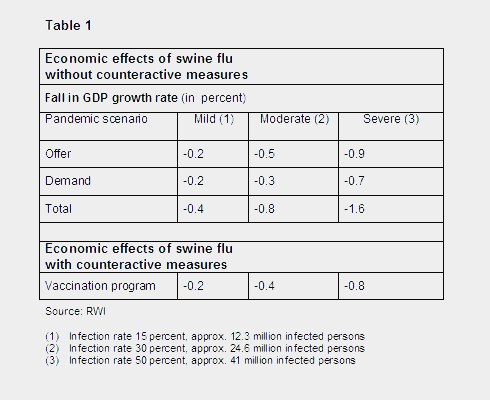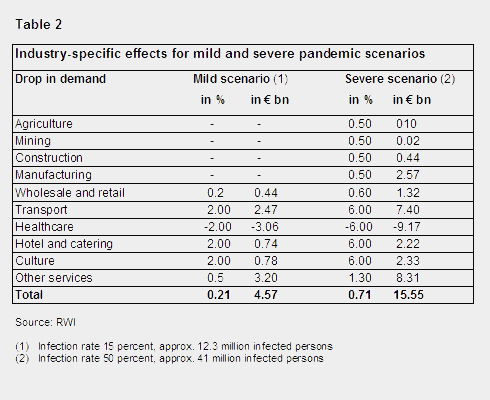The negative effect of swine flu on the economy will be considerably less severe than was widely expected, according to the latest study by Allianz and the Rheinisch Westfälisches Institut für Wirtschaftsforschung (RWI). With swine flu, the course of the disease is milder than was the case with bird flu, so the RWI predicts that the German economy as a whole will shrink by 1.6 percent if the pandemic is severe, 0.8 percent if it is moderate, and 0.4 percent if it is mild (see Table 1).
Allianz and RWI expect GDP to drop by 0.4 to 1.6 percent
The damage to the country's economy due to bird flu was more than double that. "The fact is that due to the current economic downturn, companies are less affected by swine flu than they would be if the economy were booming," explains Professor Christoph Schmidt, President of the RWI. "In times of crisis companies have fewer orders, so if part of the workforce is taken ill the impact is less severe. By contrast, if production was running at full speed, a high degree of workforce illness would have a more significant economic impact." Certain industries, however, will be more affected than others, particularly the transport, hotel and catering and culture industries. Only the healthcare industry will register a plus (see Table 2).

Wilfried Johannßen, member of the management board of Allianz Private Krankenversicherungs-AG: "Allianz – like most other DAX companies – is well prepared, with a comprehensive pandemic plan"
Counteractive measures would reduce cost of pandemic
Regardless of whether or not a pandemic actually breaks out and how serious it is, national economies inevitably incur costs because they are forced to plan for contingencies. Nevertheless, investing in the preparation and testing of pandemic plans, and spending funds to make flu medicines available or produce vaccines is not only essential, but also economically beneficial, as these measures would help to check the epidemic.
According to RWI, introducing a countrywide vaccination program would significantly reduce the rate of infection and therefore the negative effect on the gross domestic product (GDP) to -0.2 percent (from -0.4) for a mild and -0.8 percent (from -1.6) for a severe pandemic scenario. "We would therefore reiterate the recommendations made by the German Standing Committee on Vaccination (STIKO), because if enough people are vaccinated against H1N1, this will not only limit the spread of the infection, but will also increase the basic immunity of the population," says Wilfried Johannßen, member of the management board of Allianz Private Krankenversicherungs-AG.
Contingency planning: Shortfall in healthcare provision to be expected
Although contingency planning in Germany has been significantly improved since the bird flu crisis three years ago, there are still deficits, particularly when it comes to workplace contingency plans and healthcare provision. "Allianz – like most other DAX companies – is well prepared, with a comprehensive pandemic plan," says Johannßen. On average, however, he continues, only one in two companies in Germany have pandemic plans in place, and this rises to one in ten for small and medium-sized businesses. Not all hospitals are well prepared, either.
"When the second wave of this pandemic comes, there will be shortfalls in hospital provision. A lack of ventilator and intensive care beds will be the main problem, but personnel shortages are also to be expected," says Sebastian Krolop, director of healthcare consultants ADMED GmbH. The RWI and ADMED expect a rate of infection of 15 percent and a shortfall of 45,000 intensive care and ventilator beds. If the course of the disease were more severe with an infection rate of 50 percent, this figure would rise to 180,000, and there would also be too few normal hospital beds.


The complete study by Allianz Deutschland AG, "Leben mit der Pandemie", is available online in German at www.allianzdeutschland.de/presse.
As with all content published on this site, these statements are subject to our Forward Looking Statement disclaimer.
Link to the disclaimer